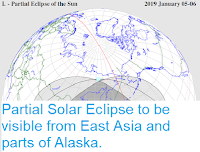On Monday 4 March 2019, at 11.27 am GMT, the Moon will be at its
furthest
point from the Earth in 2019, a distance of 406 390 km. The Moon orbits
the Earth every 27.5 days, and like most orbiting bodies, its orbit is
not completely circular, but slightly elliptical, so that the distance
between the two bodies varies by about 3% over the course of a month.
This elliptical orbit is also not completely regular, it periodically
elongates then returns to normal, making some perigees closer than
others. Because this is an elongating and contracting elliptical orbit,
rather than a change in the average distance between the Earth and the
Moon, the most extreme Lunar Perigee and Apogee of each year typically
happen in the same Lunar Month; this year the closest Lunar
Perigee occurred 19 February at 9.07 am GMT.
Diagram showing the relationship of the Lunar orbit and Lunar month. Southern Astronomical Delights.
Although this is the furthest point from the Earth that the Moon will
reach in 2019, it is not exceptional. The Moon reached 406 459 km from
the Earth on 15 January 2018, and will reach 406 668 on 20 March 2020.
See also...
Follow Sciency Thoughts on Facebook.







